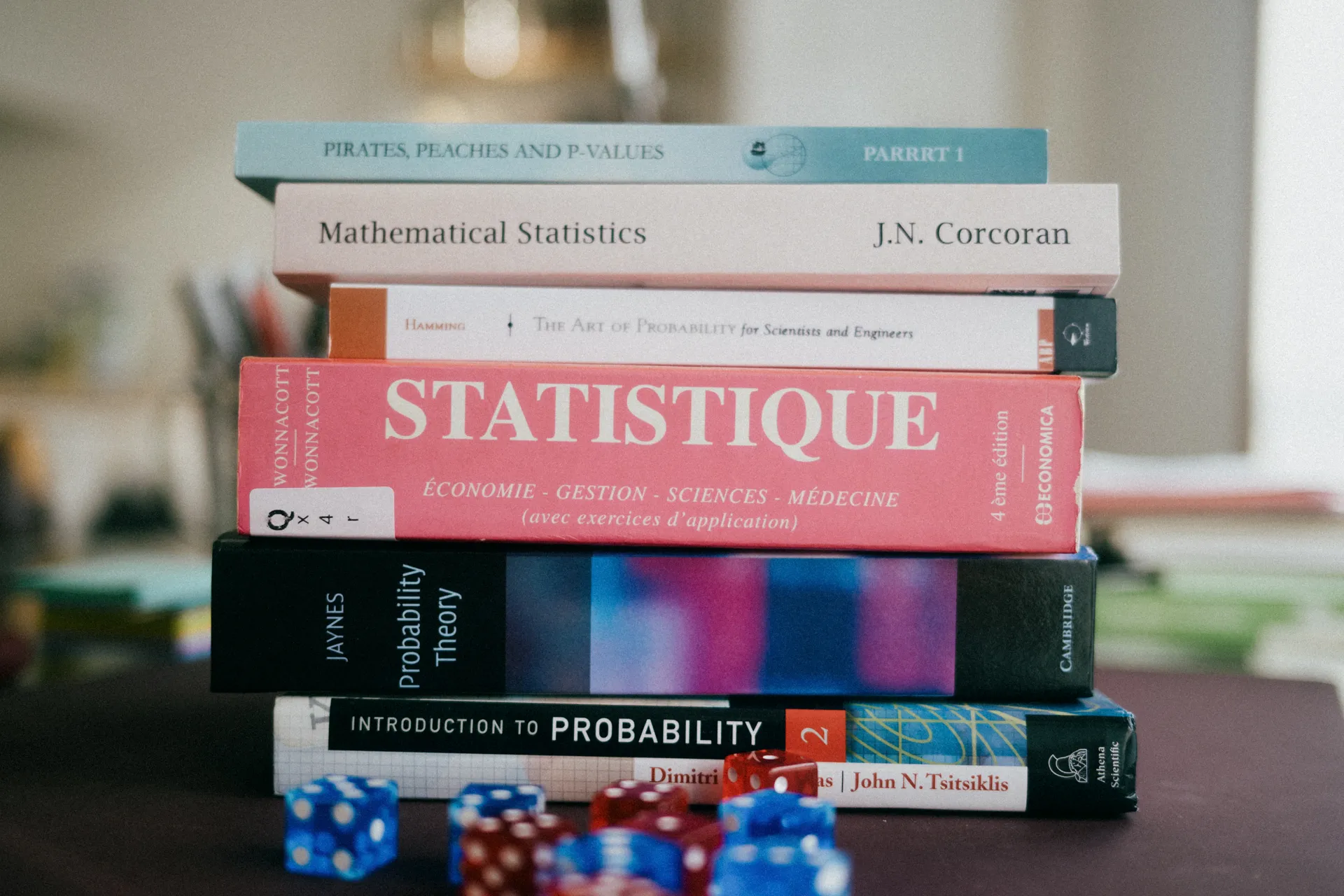## October
Those are the books I currently use to get up to speed with probability and statistics.
Not understanding a specific teacher and lacking the ability to grok a topic are two very separate things.
It took me some time to understand this simple fact.
To study a new topic I now grab the $n$ best books I can put my hands on.
Where a book will leave me puzzled, another will click instantly.
Don't stay stuck.

## September
I've compiled, translated and enriched my notes on [[Numerical Sequences|sequences]]:
- Demonstrated how sign tests can be simplify into ratio tests under certain circumstances by using an identity in the study of numerical sequences' monotonicity
- Added proofs for the formulas used to sum the terms of arithmetic and geometric sequences
- Demonstrated how discrete sequences can be analyzed as if they were continuous functions using derivatives
___
I'm back at university, at [Arts et Métiers](https://artsetmetiers.fr/fr) this time.
We've just started Differential and Integral Calculus (MVA005) with [Iraj Mortavi](https://scholar.google.com/citations?user=DokRauAAAAAJ&hl=fr)
This made me realize how little I tend to challenge myself when studying alone.
I'd be thinking over a problem for a day or two.
Being in a classroom with three and a half minutes on your hands to write a proof, and seeing others doing it changes your frame of reference.
It's hard to get the true measure of what can be accomplished when you're all by yourself.

___
Just because you started a book doesn't mean you should finish it. Put it down or transform it into something else instead. Try book folding, for instance.
This isn't just about books, of course. If you realize something isn't not going to work out, best to quit as soon as possible.

___
It is incredibly hard, when researching a subject, to fight the part of you that wants to form an opinion right away and look for supporting evidence. This is part of the [[Confirmation Bias|confirmation bias]].
___
I just discovered the poem [[From The Keeper Of Sheep]] by Fernando Pessoa.
>I have no philosophy, I have senses…
>If I speak of Nature it's not because I know what it is
>But because I love it, and for that very reason,
>Because those who love never know what they love
>Or why they love, or what love is.
This paragraph echoes with the lurking feeling I've had for the past decade that the world is not *knowable*.
We try to discover this world's noumena, its governing principles, by observation of its phenomena (Kant 1781).
At the same time, we are dependent on how we observe and measure them. We think we see the world, when we only ever see shadows on a wall, not what projects them (Plato 375 BC).
We can refine a working understanding of the world, but it is forever incomplete.
>"The Tao that can be told is not the eternal Tao." (Tao Te Ching)
There's something else I'd like to read on the subject, what Lucian Blaga calls [[Transcendent Censorship]], the obstacles the world actively places in the way of its discovery. Unfortunately, this is a book that's hard to come by, so it will have to wait.
___
A thought I had while reading [[What I Learned Losing a Million Dollars]]: You start making good decisions when you learn to watch out for the signs of a bad decision.
## August
One reason we should try to do *less* is that we consistently tend to underestimate the time it takes to do something worth it, whether it's learning or building.
I've found that in order to learn, one must go through *several* resources on the same subject in order to get a working understanding of it. There's no such thing as silver bullets. You can't read a book or go through one course and expect to be set for life on the subject.
Being bad at something and being bad at understanding one teacher or thinker are two separate things. This is why my [[Library|library]] has lots of redundancies.
And even if all you have is one resource, you'd have to revisit it several times while practicing what you've learned to grow your understanding.
Working more hours on less things is the key to success, not the reverse. But that depends on your definition of success, of course.
___
Most days I feel just lucid enough to grasp how far out of my depth I am, yet not so much as to do anything consequential about it... It's like having a flashlight but being stuck at the bottom of a well.
___
I sometimes I catch myself thinking that I haven’t the time to do the thing I want to do *well enough*.
This morning, for instance, I woke up later than planned, with not enough time on my hands to practice the full first ashtanga yoga series before starting the rest of the day. Still, I found it in me to decide that something is better than nothing. So I practiced only the first postures, which energized me for the day.
Progress is mostly about showing up and doing what can be done when reality doesn’t align with our expectations, I think. I’ll try to hunt down further those little moments where I could show up in spite of my expectations.
___
Two things matter: The *most important thing* and the *most simple thing*. One without the other is like trying to express your position using only latitude or longitude. The former tells you what to work on, the latter how to work on it.
You could try and do the reverse. That's how you end up watching YouTube videos such as "The 7 most important things about cutting tomatoes", and [[Yak Shaving|yak shaving]].
___
A good rule for meetings: Don't bring your ego to a facts fight.
Sadly, this works the other way around, too.
___
> "Writing is nature's way of telling us how **lousy our thinking is**." *— Leslie Lamport*
I've just heavily edited a piece I had written on the [[Zeigarnik Effect]]. As I wrote it, it felt fairly clear and straightforward. Asking around for feedback and letting some time pass helped me realize how unclear and unstructured it was.
The argument was full of holes as I was jumping back and forth between ideas all along. Funny how you don't notice what's missing from someone else's perspective, how many gaps your brain is filling either to protect or help you, and how confident you feel that you've said all there is to say for your interlocutor to understand you unless you actively seek feedback.
A critical issue when writing is getting relevant feedback, which is not straightforward depending on what you write about. This is something I'd like to work on.
___
During one of those YouTube rabbit holes I watched the [account of the former FBI undercover agent Scott Payne](https://www.youtube.com/watch?v=h6au3ppTm7g).
In this high-stress job, one mental trick agents use is to visualize themselves dropping it all into a bush when they come home, whether it's there or not. [[Context Switching|Context switching]] creates [[Attention Residue|attention residue]], which means that when you switch activities, a part of your brain still continues to be busy with the previous thing for a while.
It's interesting to see the [[Zeigarnik Effect]] in action. Freeing mental resources from a previous context can be sped up by creating a clear end point for the loop you're in.
___
>"All man's miseries derive from not being able to sit quietly in a room alone." *— Blaise Pascal*
I have been more or less respecting a Sunday Shabbat for a couple of months now. It gives rhythm to my week, and I started to realize how much I forget to let myself breathe.
In music, silences between the notes are as important as the notes themselves, this is where they hang and dissolve into one another.
Similarly, we need time doing nothing, so that our mind can process everything that we've been doing.
___
Seneca's Letter II from [[Letters from a Stoic|Letters from a Stoic]] clicked with some other ideas I had been compiling on [[Rejection]] in the background, so I felt it was about time I structured them here.
What resonated with me the most: "Nothing is so useful that it can be of any service in the mere passing."
___
18 years have gone by since the last line of C++ I wrote. I plan on alternating courses and personal projects to get up to speed. My first project (where is the fun in starting with a course) is [[Plotting the Mandelbrot Set with SFML]]. I will enrich the project notes as I move the project forward. In the meantime, I've started taking [Introduction à la programmation orientée objet (en C++)](https://www.coursera.org/learn/programmation-orientee-objet-cpp/). I've already found quite a few inaccuracies, mostly statements on how the language works, and outdated content. But it's still a decent outline of the core concepts. I'm taking the time to dig deeper and proof check the materials for myself, and compiling them into a [[fieldnotes/Topics/C++ Reference|C++ Reference]] so it can benefit myself in the future, and others.
___
Earlier this year I read [[How to Take Smart Notes|How to Take Smart Notes]]. I discovered the [[Zeigarnik Effect]] and made a few notes on the topic, at last. The gist is, either you get the compounded effect of being focused on meaningful problems, or that of being distracted by menial stuff. I'm trying to implement simple daily strategies so that it can benefit me instead of derserving me.
## July
Read the article [You and Your Research](https://d37ugbyn3rpeym.cloudfront.net/stripe-press/TAODSAE_zine_press.pdf) by Richard Hamming, which has found his way into his book [[The Art of Doing Science and Engineering|The Art of Doing Science and Engineering]]. Just like Schopenhauer advocates that the best way to read good books is to avoid reading bad ones, he outlines the necessity of working on important problems if one wants to achieve meaningful results, while noticing most of us are busy with what we deem ourselves to be second-order problems. Of course, your definition of important is unique. A puzzling problem he offers practical solutions to.
___
As I'm teaching myself Calculus, I've started writing a series of articles, [[fieldnotes/Topics/Calculus by Example]]. Those are meant to walk you through practical problems of gradually increasing complexity, introducing one concept at a time. The motivation for this is twofold. First, most Calculus courses, books and resources I could put my hands on presuppose you have either access to external help, like a university TA or prior extensive knowledge, making some of the explanations circular, at least to me. Second, explaining things helps me identify the limits (punintended) of my understanding and ask questions to refine it.
___
Had some thoughts on [[fieldnotes/Notions/Positioning|positioning]] while watching *House of David*.
___
I've been reading [[The Bed of Procrustes|The Bed of Procrustes]]. It's a repository of aphorisms, and as a review I thought it'd be interesting to (1) explain the book's leitmotive (2) try to write a few aphorisms myself on the subject. Talk the talk and walk the walk, as they say.
## June
> "If you're wrong, you will die. But most companies don't die because they are wrong; most die because they don't commit themselves. They fritter away their valuable resources while attempting to make a decision. The greatest danger is in standing still." (Grove 1996)
Indecision kills. [[Two-Way Door Decisions|Most decisions are reversible]], so instead of staying stuck in [[Analysis Paralysis|analysis paralysis]] or committing yourself to everything at once, you can approach them are tests or [[Thinking in Bets|bets]]. The only thing you really need to decide *ahead* of time is (1) how you're going to evaluate whether the decision you're making is living up to your expectations, (2) the criteria based on which you'll get out of the decision, and (3) how much resources you're willing to sacrifice to get the answer. Then you can just let the answer self-compute.
___
[[Resulting|Resulting]] works both in hindsight and foresight. If you're focused on what your ego wants to achieve instead of what you're actually doing, you can't perform well. A mental trick to distance yourself from your ego is trying to fail. Below is Willem Dafoe discussing the idea much better than I ever possibly could.

## May
This morning I came across a mother and her child on their way to school. She asked her son: Do you enjoy learning? I feel this is something we often dismiss. Enjoy ourselves and laughing at work is essential.
We're told or tell ourselves the struggle must be part of the process. And by struggle I mean being bored to death. Maybe struggling is what we do because it feels familiar, safe and under control after all the lousy teacher we came across. Maybe we should unlearn learning.
Paradoxically, I'm convinced having fun is the only way to get good at anything. At least the only thing I ever became good at were things I enjoyed doing. I don't remember who it was who said you can’t compete with someone who's having fun.
It would then follow that a good strategy for life is to focus on what is fun to you and work to others.
___
>"Ce qui se conçoit bien s’énonce clairement, et les mots pour le dire arrivent aisément."
>— *Nicolas Boileau*
My litmus test for bullshit is both simple and deadly effective. It's useful in hiring and other kinds of situation where someone's bullshit can harm you. The best part is, it works even if the person if front of you knows you're doing it.
When someone engages in name dropping and complex jargon, there are two possible explanations: (1) They know something you don't, or (2) they're faking it.
The test is to simply admit you don't understand and persistently ask for clarification. People bluffing rely on the fact you are afraid to look like an idiot. If you demonstrate your willingness to ask as many 'stupid' questions as it takes, you neutralize their strategy.
Three things can happen from there.
(1) Your interlocutor actively tries to drown you in jargon while acting as if they're saying trivial things to discourage you to ask further questions. They're building a wall and failed the test, so act accordingly.
(2) They genuinely know something you don't and you can see they're trying to find a way to explain what they thought to be obvious in simple terms. You're both trying to build a bridge, but you still fail to achieve clarity after a reasonable amount of efforts. Either you should not be the person interviewing them or they're not the right person for the job. In any case, establishing communication proves to be hard, which is a red flag. Do what you must.
(3) They welcome questions and the pool of shared understanding grows by the minute. They've passed the test.
Bullshit relies on your passive acceptance. So don't give it.
## April
Rain is much more fun when I'm running. I call it "free coolant" then, and take it as a challenge. I actually feel energized by the sheer realization this will demoralize many a participant, thus giving an edge to whoever doesn't care or benefits from it. Yet, for some reason that escapes me, I keep noticing how pissed I am when it rains while I'm walking around the city.
[[Stressors|Stressors]] act as sources of energy and motivation only if you allow them to. Otherwise, you will be crushed under the weight of all the things you don't control accumulating in the background.
I remember reading something on athletes and stress; a journalist or a researcher was surveying athletes and telling them they must be stressed before competition day. Most athletes responded by stating they were feeling excited and energized.
Studies have shown both stress and excitement have the same physiological cues but drastically different results.
Framing matters.